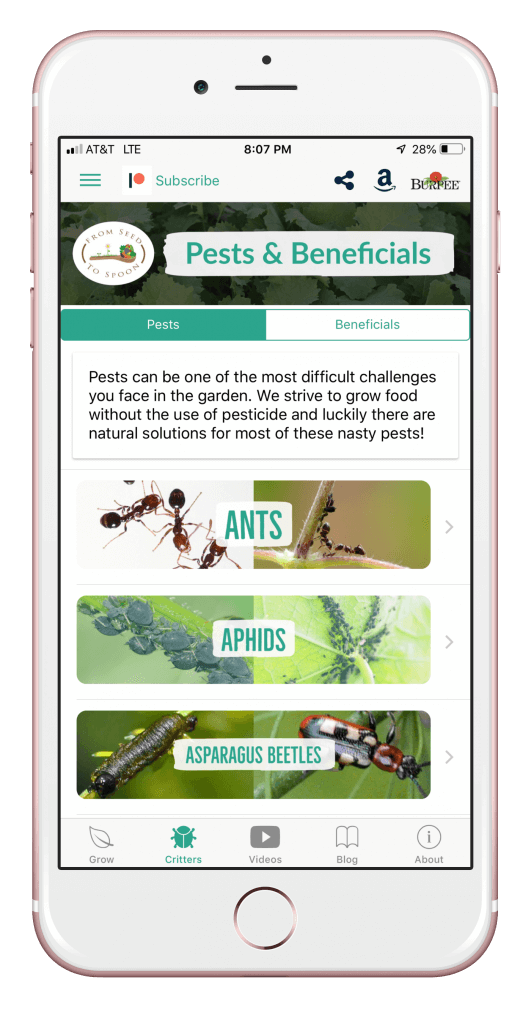What Bugs Eat Raspberry Fruit In The Garden
Raspberries come in various shades of red and gold. These berries are super juicy and are very flavorful! Raspberry bushes will continue to give fruit year after year, however it takes 2 years for the plant to first produce berries. You can cut any canes that produce fruit at the base after the season is over since they won't produce again. Pests can give you a few issues, but you can solve them fairly easy by following the steps below!

Birds can be both a pest and an ally in the garden. Birds help with pest control eating a wide variety of insects including aphids, caterpillars, mosquitos, and spiders. On the downside, they will also steal seeds and eat your tomatoes!
Treatment Options:
-
You can protect your seeds by covering them with a layer of burlap or shade cloth. I typically hold it down with a hardware mesh panel because that'll help keep cats out as well.
-
Bird netting will keep birds off of your tomatoes, berries, and other fruits!
-
Scare tape will also help keep birds away from problem areas.
-
We also have a couple of fake owls stationed around the garden that are meant to scare birds away. Be sure to move them around every day or so, or the birds will figure out your trick!

Birds can be both a pest and an ally in the garden. Birds help with pest control eating a wide variety of insects including aphids, caterpillars, mosquitos, and spiders. On the downside, they will also steal seeds and eat your tomatoes!
Treatment Options:
-
You can protect your seeds by covering them with a layer of burlap or shade cloth. I typically hold it down with a hardware mesh panel because that'll help keep cats out as well.
-
Bird netting will keep birds off of your tomatoes, berries, and other fruits!
-
Scare tape will also help keep birds away from problem areas.
-
We also have a couple of fake owls stationed around the garden that are meant to scare birds away. Be sure to move them around every day or so, or the birds will figure out your trick!

Fruit worms can be extremely aggravating to deal with. Prevention is key with these pesky critters! It is important to work to try and prevent these from ruining your fruit.
Treatment Options:
-
Removing all the surrounding debris and weeds from around your trees or bushes can help to prevent egg laying by the moths.
-
Hand picking infected fruits and disposing of them can help prevent spread of the worms.
- Use the organic pesticide, BTK (bacillus thuringiensis Kurstaki). BTK is a naturally occurring microorganism that sickens and kills caterpillars without harming butterflies, bees, and other beneficial insects. There are varied opinions regarding the safety of BTK, but it's classified as an organic treatment and is certainly safer than using a more toxic pesticide.
-
Beneficial insects can be very helpful with this pest as well! Lacewings and ladybugs attack the eggs and the smaller larvae. Parasitic wasps can attack the worm itself (if it can get to it). Praying mantises can kill the adult moths before they lay their eggs.
-
The fruit worm comes from a moth that lays its eggs into fruit. Catching the moths that lay these eggs can help to prevent a worm problem in the future.

The harlequin bugs, or stink bugs, are primarily black with brightly colored markings in orange, red, or yellow on the wings. It lays its barrel-shaped eggs in clusters. These bugs pierce the plant and suck out the juices, causing them to wilt and turn brown. If left untreated, the plant will eventually die.
Treatment Options:
-
Hand-picking bugs and tossing them in soapy water is one of the best ways to ensure that they are removed.
-
Another way to help prevent infestation is to companion plant strongly scented plants such as garlic, mint, rosemary, and sage.

Japanese beetles, or june bugs, are metallic green with bronze wing covers. The larvae of the beetle, called grubs, are white with a brown head. The adults eat and attack foliage, fruits, and flowers while the grubs eat the roots of your plants.
Treatment Options:
-
Hand-picking and placing the beetle in a soapy water bucket is a great way to get rid of these pests.
-
Companion planting plants with a strong odor, such as garlic, can help to deter adults from eating the foliage.
-
Milky spore has been shown to be one of the best treatments for killing the grubs that will eventually grow up into june bugs. After applying these naturally occurring white spores to the ground, the grubs will ingest the bacteria and die within a few weeks.
-
Insect netting is one of the easiest way to prevent insect damage on your plants!
- Sprinkle diatomaceous earth over areas you want to protect. Be careful though: DE can harm beneficial insects as well if they come in contact with it.

Leaf-footed bugs are approximately 1 inch long, some with a white zigzag pattern on their wings. They have long legs similar to a cricket with an oval shaped body. They are recognizable by their hind legs which look leaf-like. They have piercing mouthparts which probe into plants to suck their juices. This can cause discoloration and damage to the plants.
Treatment Options:
-
Hand-picking and squishing or placing them in a soapy water bucket is a great way to get rid of these pests.
-
Companion planting can help deter leaf-footed bugs. Sunflowers are especially good at attracting these pests away from other plants.
-
Another good prevention is to remove excess weeds and grass around the garden areas as this can help to attract them.
-
Placing insect netting (floating row covers) over your garden is the best way to prevent leaf-footed bugs from attacking your plants.
-
Put your beneficial critters to work! Attract or relocate certain critters to try and help battle your leaf-footed bugs. Leaf-footed bug predators include tachinid flies, birds, spiders, assassin bugs, snakes, lizards, and frogs.
-
Applying neem oil can also be effective for the nymph stage of leaf-footed bugs. Make sure not to apply the neem oil when the temperature is above 90, or else you could suffocate your plant!

While we love having our pet rabbits to help with making free fertilizer, wild rabbits can be quite troublesome for your garden. These small mammals like to eat a lot of your greens and can be tricky to manage once they know where the food is. It is important to keep them out of your garden to protect your food!
Treatment Options:
-
Rabbits are scared of larger predators. Applying blood meal around the perimeter of your garden has been shown to deter rabbits. Rabbit repellent, fox urine granules, or even human hair and urine can help to deter them as well.

Raccoons are huge corn-lovers, and they will destroy the corn in your garden in a hurry. Keeping them out of your garden is imperative to protecting your corn.
Treatment Options:
-
Raccoons are scared of larger predators. Applying blood meal around the perimeter of your garden has been shown to deter small mammals. Raccoon repellent, fox urine granules, or even human hair and urine can help to deter them as well.
-
Raccoons can be scared of noises as well. You can leave a radio close to the problem area to try and scare them away.
-
They can also be deterred by a mixture of garlic and chili powder sprinkled around the problem areas.

Raspberry cane borers are a beetle that especially loves to feed on your berries. You can tell you have a problem if you notice wilting in your plants and see rings cut into the stem directly below the wilting.
Treatment Options:
-
As soon as you notice the issue, simply remove the portion of the affected plant and throw in the trash or burn.

These mites are an extremely small relatives of spiders. They are typically found on the undersides of leaves. An easy way to check for them is to place a sheet of white paper underneath the leaves and gently tap. If you see moving specks on the paper then you have a problem.
Treatment Options:
-
Putting your beneficial insects to work is one of the best ways to help with spider mites! Releasing or attracting green lacewings and ladybugs will help.
-
Applying neem oil will also help to get rid of spider mites, but make sure not to apply when the temperature is above 90, or else you could suffocate your plant!
-
Homemade sprays can also be helpful. You can make a spray with garlic or with equal parts water and alcohol.

These small rodents can be challenging and can destroy a garden! They can be pesky, so trial and error is important to see what works best for your visitors.
Treatment Options:
-
Stationing a fake owl or scarecrows around the garden are helpful tricks to scare away squirrels. Be sure to move them around every day or so, or they might figure out your trick!
-
Squirrels are scared of larger predators. Applying blood meal around the perimeter of your garden has been shown to deter small mammals. Squirrel repellent, fox urine granules, or even human hair and urine can help to deter them as well.
-
Cats and dogs are effective hunters of squirrels and other small rodents! Even just their smell and presence in the yard can help to keep them out of your gardens.
-
Squirrels dislike strong and spicy smells. Try making an apple cider vinegar spray or sprinkle cayenne pepper around your garden.


What Bugs Eat Raspberry Fruit In The Garden
Source: https://www.seedtospoon.net/how-to-manage-the-most-common-pests-for-raspberries-organically-in-your-backyard-vegetable-garden/
Posted by: barclaygrance.blogspot.com

0 Response to "What Bugs Eat Raspberry Fruit In The Garden"
Post a Comment